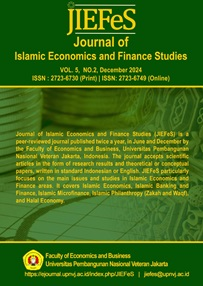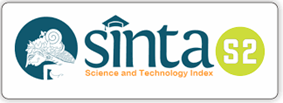Determinants of Halal Tourism of Setu Babakan Jakarta Based on Global Muslim Travel Index and Importance Performance Analysis
DOI:
https://doi.org/10.47700/jiefes.v5i2.9555Keywords:
GMTI, Halal Certification, Halal Tourism, IPA, PBB Setu BabakanAbstract
Setu Babakan Betawi Cultural Village (PBB) is a betawi-nuanced tourist area developed by the local government of Jakarta and is planned to become a halal tourist destination. This study aims to determine whether the UN Setu Babakan tourist destination implemented Sharia principles as criteria set by the Global Muslim Travel Index (GMTI). To ensure that the analysis results are valid and credible and can be applied by the management of PBB Setu Babakan, research was conducted using primary data with Importance Performance Analysis (IPA). The respondents were tourists at the UN Setu Babakan, Muslim, and over 17 years of age. The sample consisted of 130 respondents, most of whom were under 20 years of age, high school, and student education. The results showed that according to respondents, services that need to be improved are hotels, SPAs, saunas and massages, travel bureaus and tour guides, many of which are not halal certified, so tourists hesitate to use these services. These findings are expected to facilitate managers and local governments to develop the right strategy so that visitors to Setu Babakan increase by improving facilities that are lacking.
Perkampungan Budaya Betawi (PBB) Setu Babakan merupakan daerah wisata bernuansa Betawi yang dikembangkan oleh pemerintah daerah Jakarta, yang direncanakan akan menjadi destinasi wisata halal. Penelitian ini bertujuan untuk mengetahui apakah destinasi wisata PBB Setu Babakan telah benar-benar menerapkan prinsip-prinsip syariah sebagaimana kriteria yang ditetapkan oleh Global Muslim Travel Index (GMTI). Untuk itu menjamin hasil analisis valid, kredibel dan dapat diterapkan oleh fihak manajemen PBB Setu Babakan maka dilakukan penelitian dengan menggunakan data primer, dengan analisis IPA (Importance Performance Analysis). Responden yang diambil adalah wisatawan di PBB Setu Babakan dan beragama Islam dan usia diatas 17 tahun. Sampel terkumpul sebanyak 130 responden, sebagian besar berusia dibawah 20 tahun, pendidikan high school dan student. Hasil penelitian menunjukkan bahwa menurut responden layanan yang perlu diperbaiki adalah hotel, SPA, sauna dan massage, travel bureau dan tour guide banyak yang belum tersertifikasi halal, sehingga wisatawan ragu-ragu untuk menggunakan layanan tersebut. Temuan ini diharapkan dapat memfasilitasi pengelola dan pemerintah setempat untuk membuat strategi yang tepat agar pengunjung setu babakan meningkat dengan memperbaiki fasilitas yang kurang.
References
Abdullah, Muh. W., Kadir, S., & Alaaraj, H. (2020). Sharia Financial Literation in Developing Sharia-Based Business for Rural Communities in South Sulawesi. https://doi.org/10.24042/FEBI.V5I2.7050
Abozaid, A. (2020). Shortcomings and proposed reforms in the existing shariah governance of islamic banking. https://doi.org/10.18326/IJIER.V2I1.3638
Adel, A. M., Dai, X., Yan, C., & Roshdy, R. S. (2021). Halal strategies on official government tourism websites: an extension and validation study. Tourism and Hospitality Research. https://doi.org/10.1177/1467358420986236
Alzeer, J., Abou Hadeed, K., & Laher, I. (2020). Halal Certification of Food, Nutraceuticals, and Pharmaceuticals in the Arab World. https://doi.org/10.1007/978-3-319-74365-3_36-1
Amalia, F. A.; Nova, M; Koh, C; & Suhartanto, D. (2024). Sustainable development in the halal tourism industry: The role of innovation and environmental concerns. E3S Web of Conferences https://doi.org/10.1051/e3sconf/202447907038 479. ISSAT 2023
Apriyani, A., Isyanto, P., & Yani, D. (2023). Implementation of Working Discipline In Improving Employee Performance: Case Study on the CV. XYZ. https://doi.org/10.58229/jissbd.v1i1.24
Biancone, P., Secinaro, S., Radwan, M., & Kamal, M. (2019). Halal tourism: An opportunity for the global tourism industry. Tourism Analysis. https://doi.org/10.3727/108354219X15511865533112
Chuweni, N. N., Mn, I., Mohamed, N. A., Ali, S. N. M., Fauzi, N. S., & Arshad, H. (2021). Is the Sharia-compliant Hotel a Good Investment? Using Netnography Research Method to Explore the Society’s Perceptions. https://doi.org/10.1007/978-981-33-4854-7_4
Dugonjić, A., & Uršulin-Trstenjak, N. (2022). Halal tourism vs sustainable tourism. Ekonomski Izazovi. https://doi.org/10.5937/ekoizazov2222031d
Elsa; Febriyani, and Hasanah, I. (2021). Analisis Faktor-Faktor Dalam Mengembangkan Pariwisata Halal Di Banten. Tazkiyya: Jurnal Keislaman, Kemasyarakatan dan Kebudayaan. Vol 22(1). Januari - Juni 2021, P-ISSN: 1411-7886;
Fadly, M & Ismail, Y, (2019). Analisis Faktor-Faktor Dalam Pengembangan Wisata Halal di Kabupaten Solok. Jurnal ALTASIA. Vol. 1(1), Tahun 2019
Gunawan, C. (2019). Mahir Menguasai SPSS (Mudah Mengolah Data dengan IBM SPSS Statistic 25) (C. M. Sartono (ed.); Pertama). Deepublish
Hadiasali, A. E., Wijaya, S., Widjaja, D. C., & Jaolis, F. (2022). The influence of sharia hotel indicators towards its competitive advantage and guest intention to stay: an appraisal. Malaysian Journal of Syariah and Law. https://doi.org/10.33102/mjsl.vol10no2.401
Haleem, A., Khan, M. I., & Khan, S. (2019). Halal certification, the inadequacy of its adoption, modelling and strategising the efforts. Journal of Islamic Marketing. https://doi.org/10.1108/JIMA-05-2017-0062
Harfaz, M.H.H; Naufal, D. Z. N; Berliana, S; Febrianty, Budilaksono, S; & Kencana, Strategi Pengembangan UMKM Desa Wisata. Vol 57 Tahun 2023: Seminar Nasional Dies Natalis Universitas Atma Jaya Yogyakarta. ISSN : 2986-0218
Hidayat, H. Y ; Febriani, D. A & Ravanelli, D.M. (2019). Tinjauan Dynamic Governance Dalam Mendukung Pengembangan Perkampungan Budaya Betawi (Pbb) Setu Babakan Menuju Wisata Halal. Spirit Publik. Volume 14(2), 2019. Halaman 136-153. P-ISSN. 1907-0489 E-ISSN 2580-3875
Irdiana S, Ariyono KY, & Drmawan K. 2021. Pengaruh Wisata Halal Terhadap Kepuasan Pengunjung Dan Minat Berkunjung Kembali. J Cakrawala Ilmu 2021;1:421–8. https://doi.org/10.53625/jcijurnalcakrawalaindonesia.v1i3.620.
Jeaheng, Y., Al-Ansi, A., & Han, H. (2020). Impacts of Halal-friendly services, facilities, and food and Beverages on Muslim travelers’ perceptions of service quality attributes, perceived price, satisfaction, trust, and loyalty. Journal of Hospitality Marketing & Management. https://doi.org/10.1080/19368623.2020.1715317
Junaedi. J. (2020). Halal-friendly tourism and factors influencing halal tourism. Management Science Letters, 10 (2020). doi: 10.5267/j.msl.2020.1.004
Kovjanic, G. (2014). Islamic tourism as a factor of the Middle East, Turizam, 18(1), 33-43.
Manan, A., Wirianto, D., & Fadhilah, M. A. (2023). Halal Tourism: A Proposed Sharia Model for Implementation. Jurnal Ilmiah Peuradeun. https://doi.org/10.26811/peuradeun.v11i1.784
Mannaa, M. T. (2017). Is Islam with or against Tourism? Halal Tourism Perception; Definition and Requirements. https://doi.org/10.21608/JAAUTH.2017.50042
Martaleni; Hermawati, A; Handhajani, S. B. P;& Yasa, N. N. K; (2021). An Analysis on Halal Tourism Potential: An Overview of the Educational Aspects and Number of Tourist Visits. Journal of Indonesian Tourism and Development Studies.
Mustaqim, D. A. (2023). Strategi Pengembangan Pariwisata Halal Sebagai Pendorong Ekonomi Berkelanjutan Berbasis Maqashid Syariah. AB-JOIEC : Al-Bahjah Journal Of Islamic Economics. (2023) Vol 1 (1 ): 26-43. DOI: 10.61553/abjoiec.v1i1.22. p-ISSN: 3025-793X e-ISSN: 3025-5686
Nilawati; Zaiman, M. F; Antasari, Rr. R. & Fauziah. (2024). Halal Tourism in Kampung Al-Munawar, Palembang: Analysis with the Global Muslim Index Travel Approach. EKOMBIS REVIEW: Jurnal Ilmiah Ekonomi Dan Bisnis, 12(2). doi: https://doi.org/10.37676/ekombis.v12i2. doi: 10.21776/ub.jitode.2021.009.01.09. E-ISSN : 2338-1647. http://jitode.ub.ac.id
Nurhidayati & Akbar, N. (2024). Analyzing Consumer Preferences in Selecting Halal Tourism Destination. Al-Falah: Journal of Islamic Economics. Vol. 9(1). 2024. ISBN: 2548-2343 (p), 2548-3102 (e)
Pranika, R; Ghofur, R.A; Madnasir; Zaelani, A. Q; & Fasa, M. I. (2023). Analysis Of The Global Muslim Travel Index (GMTI) Muslim-Friendly Tourism In Improving Community Economy Reviewed From An Islamic Economic Perspective. JIMEA (Jurnal Ilmiah MEA (Manajemen, Ekonomi, dan Akuntansi). Vol. 7(3), 2023. P-ISSN; 2541-5255 E-ISSN: 2621-5306.
Saad, H.E., Ali, B.N., & Abdel Ati, A.M. (2014), Sharia compliant hotels in Egypt: Concept and challenges, Advance in Hospitality and Tourism Research, 2(1), 1-15.
Rahman, M; Moghavvemi, S; Thirumoorthi, T & Rahman, M. K. (2020). The impact of tourists’ perceptions on halal tourism destination: a structural model analysis. Vol. 75(3) 2020, pp. 575-594, © Emerald Publishing Limited, ISSN 1660-5373. DOI 10.1108/TR-05-2019-0182. Page : 575 - 593
Ramadhanti E, & Marlena N. (2023). Analisis strategi kualitas layanan menggunakan metode importance -performance nanalysis (IPA). FORUM EKONOMI 2023;23:431–41
Rasmuddin, R., & Umar, W. (2022). Sharia certification standards: a case study of sharia certification in sharia hotels. Borobudur Law Review. https://doi.org/10.31603/burrev.6994
Ratnasari, R. T., Gunawan, S., Rusmita, S. A., & Prasetyo, A. (2019). Halal Food Certification to Improve the Competitiveness of East and Middle Business in Indonesia. KnE Social Sciences. https://doi.org/10.18502/KSS.V3I13.4266
Razalli, M. R., Abdul Rahim, M. K. I., & Hassan, M. G. (2020). A Framework of Halal-Based Operations for Hotel. Journal of Engineering and Applied Sciences. https://doi.org/10.36478/JEASCI.2019.10522.10527
Rofi, H. A, & Jaharuddin. (2024). Analisis Potensi, Tantangan dan Strategi dalam Pengembangan Wisata Halal di Banten. EKOMA : Jurnal Ekonomi, Manajemen, Akuntansi. Vol.3(5), Juli 2024.
Rozi, A. F, & Anam, A.K. (2024). Analisis Potensi Pengembangan Wisata Halal: Studi Kasus pada Wisata Alam Sumbermaron. JIHBIZ Journal of Islamic Economy, Finance, and Banking. P-ISSN 1238-1235 | E-ISSN 2807-6028 Vol. 8 (1). 2024 Page 60-70. http://ejournal.uniramalang.ac.id/index.php/jihbiz/. https://doi.org/10.33379/jihbiz.v8i1.3820
Safira, A., & Salsabilia, N. (2022). The Influence of Halal Destination Awareness on Halal Destination Loyalty: A Study on West Sumatera. AFEBI Islamic Finance and Economic Review. https://doi.org/10.47312/aifer.v7i01.561
Samsidar, Agustinawati, Miranda & Sari, F. M. (2023). Faktor-faktor Yang Mempengaruhi Wisatawan Dalam Memilih Objek Pariwisata Halal Di Kota Lhokseumawe. Jurnal Visioner & Strategis. Vol 12(1), Maret 2023.ISSN : 2338-2864, p.57-60
Santoso, L., Triyanta, A., & Thontowi, J. (2022). Halal tourism regulations in Indonesia: trends and dynamics in the digital era. Ijtihad: Jurnal Wacana Hukum Islam Dan Kemanusiaan. https://doi.org/10.18326/ijtihad.v22i1.73-94
Shamsuddin, A., & Mohd Yusof, F. (2020). Exploring the Issues and Challenges in Malaysian Cosmetic Halal: A Theoretical Framework. https://doi.org/10.17977/UM060.2020V1P010-014
Sihotang, F. P & Oktarina, R. (2022). Penggunaan Metode Importance Performance Analysis (IPA) dan Customer Satisfaction Index (CSI) Dalam Menganalisis Pengaruh Sistem E-Service Terhadap Tingkat Kepuasan Pelanggan. JTSI, Vol. 3, No. 1, April 2022: 1-12. DOI 10.18502/kss.v9i20.16513
Suryani, S & Bustamam, N. (2021). Potensi Pengembangan Pariwisata Halal dan Dampaknya Terhadap Pembangunan Ekonomi Daerah Provisnsi Riau. Jurnal Ekonomi KIAT. Vol. 32(2), Des 2021. p-ISSN 1410-3834 ; e-ISSN 2597-7393
Tepavčević, J., Bradić, M., & Luković, S. (2021). Analysing the satisfaction of halal restaurant guests through online ratings on TripAdvisor. https://doi.org/10.5937/BIZINFO2101001T
Verdian, E. (2019). Analisis Faktor yang Merupakan Intensi Perpindahan Merek Transportasi Online di Surabaya. Agora, 7(1), 1–8
Wibowo, M. G. (2020). Indeks Pariwisata Halal (Implementasi Fatwa DSN MUI Tentang Pedoman Penyelenggaraan Pariwisata berdasarkan prinsip Syariah di kota Bukittinggi). Jurnal Ekonomi Syariah Indonesia, 84–95. Vol. X No. 2, Desember 2020/1442 H: 84-95. https://ejournal.almaata.ac.id/index.php/JESI/indexDOI: 10.21927/jesi.2020.10(2).84-95
Widaningsih, T.T., Diana, R., & Rahayunianto, A. (2020). Community Based Cultural Tourism Development Setu Babakan, Jakarta. Journal of Environmental Management and Tourism, (Volume XI, Spring), 2(42): 486 – 495. DOI:10.14505/jemt.v11.2(42).26
Widodo, P. (2024). Analysis of Customer Satisfaction of Saung Wulan Restaurant Using SERVQUAL Method, Importance Performance Analysis (IPA) and Gap Analysis. 3rd JESICA. The 3rd Jakarta Economic Sustainability International Conference. Volume 2024.
Yudiantoro, D, & Suselo, D. (2024). Analysis Of The Global Muslim Travel Index (GMTI) Approach As An Effort To Develop Halal Tourism In The Wilis Ring Area Of Tulungagung Regency. An-Nisbah: Jurnal Ekonomi Syariah. Volume 11(01), September 2024.
Zaiman, M. F, Junaidi, H, & Uamri, U. (2022). Pengembangan Wakaf Wisata Kampung Al-Munawar Melalui Global Muslim Travel Index. Jurnal Intelektualita: Keislaman, Sosial, dan Sains. Vol. 11(2)2 (Desember, 2022). ISSN: 2303-2952, EISSN: 2622-8491, DOI: 10.19109/intelektualita.v11i2.14887
Zaki, I., Hamida, G., & Cahyono, E. F. (2020). Potentials of implementation of sharia principles in the tourism sector of batu city,east java. Amwaluna: Jurnal Ekonomi Dan Keuangan Syariah. https://doi.org/10.29313/AMWALUNA.V4I1.5294
Zamani-Farahani, H., & Musa, G. (2012). The relationship between Islamic religiosity and residents’ perceptions of sociocultural impacts of tourism in Iran: Case studies of Sare’ in and Masooleh. Tourism Management, 33(4), 802-814.
Downloads
Published
Issue
Section
License
Copyright (c) 2024 Tati Handayani, Sufyati HS, Purwanto Widodo, Pusporini, Anggi Angga Resti

This work is licensed under a Creative Commons Attribution 4.0 International License.
Authors who publish with this journal agree to the following terms:
- Authors retain copyright and grant the journal right of first publication with the work simultaneously licensed under a Creative Commons Attribution 4.0 International License that allows others to share the work with an acknowledgment of the work's authorship and initial publication in this journal.
- Authors can enter into separate, additional contractual arrangements for the non-exclusive distribution of the journal's published version of the work (e.g., post it to an institutional repository or publish it in a book), with an acknowledgment of its initial publication in this journal.
- Authors are permitted and encouraged to post their work online (e.g., in institutional repositories or on their website) before and during the submission process, as it can lead to productive exchanges, as well as earlier and greater citation of published work.

This work is licensed under a Creative Commons Attribution 4.0 International License.











